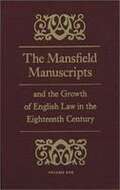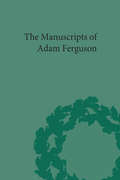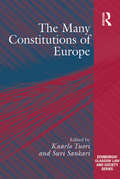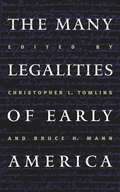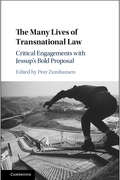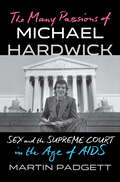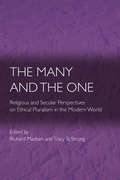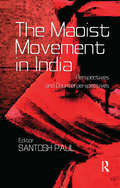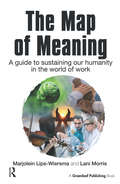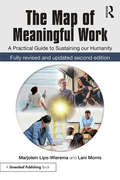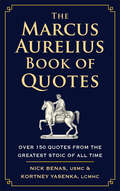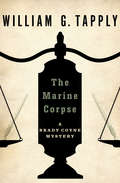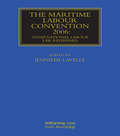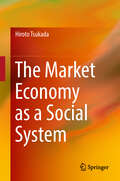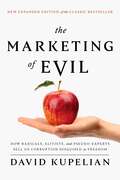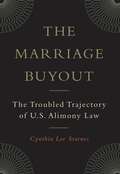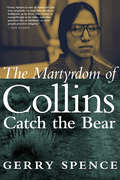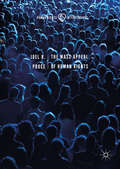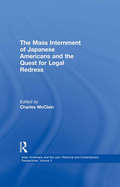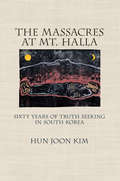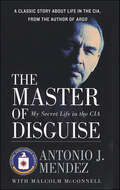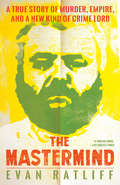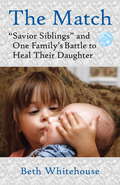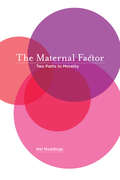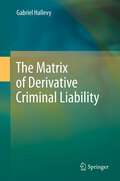- Table View
- List View
The Mansfield Manuscripts and the Growth of English Law in the Eighteenth Century (Studies in Legal History #Vol. 2)
by James OldhamUsing voluminous trial notes and previously unexplored documents, Oldham provides a reappraisal of the judicial career of Lord Mansfield, chief justice of the Court of King's Bench in England from 1756 to 1799. <p><p> In this two-volume work, he presents important biographical information about Mansfield and brings to life the context, personalities, and operational features of the Court of King's Bench during the eighteenth century.
The Manuscripts of Adam Ferguson
by Robin C DixThis volume contains a newly-edited cache of over 30 manuscript essays on a diverse range of topics and descriptions.
The Many Constitutions of Europe (Edinburgh/glasgow Law And Society Ser.)
by Suvi SankariThis volume makes a contribution to the ongoing lively discussion on European constitutionalism by offering a new perspective and a new interpretation of European constitutional plurality. The book combines diverse disciplinary approaches to the constitutional debate. It brings together complementing contributions from scholars of European politics, economics, and sociology, as well as established scholars from various fields of law. Moreover, it provides analytical clarity to the discussion and combines theory with more practical and critical approaches that make use of the constitutional toolbox in analysing the tensions between the different constitutions. The collection is a valuable point of reference not only for scholars interested in European studies but also for graduate and post-graduate students.
The Many Legalities of Early America
by Bruce H. Mann Christopher L. TomlinsThis collection of seventeen original essays reshapes the field of early American legal history not by focusing simply on law, or even on the relationship between law and society, but by using the concept of "legality" to explore the myriad ways in which the people of early America ordered their relationships with one another, whether as individuals, groups, classes, communities, or states.Addressing issues of gender, ethnicity, family, patriarchy, culture, and dependence, contributors explore the transatlantic context of early American law, the negotiation between European and indigenous legal cultures, the multiple social contexts of the rule of law, and the transformation of many legalities into an increasingly uniform legal culture. Taken together, these essays reveal the extraordinary diversity and complexity of the roots of early America's legal culture.Contributors are Mary Sarah Bilder, Holly Brewer, James F. Brooks, Richard Lyman Bushman, Christine Daniels, Cornelia Hughes Dayton, David Barry Gaspar, Katherine Hermes, John G. Kolp, David Thomas Konig, James Muldoon, William M. Offutt Jr., Ann Marie Plane, A. G. Roeber, Terri L. Snyder, and Linda L. Sturtz.
The Many Lives of Transnational Law: Critical Engagements with Jessup's Bold Proposal
by Peer ZumbansenIn 1956, ICJ judge Philip Jessup highlighted the gaps between private and public international law and the need to adapt the law to border-crossing problems. Today, sixty years later, we still ask what role transnational law can play in a deeply divided, post-colonial world, where multinationals hold more power and more assets than many nation states. In searching for suitable answers to pressing legal problems such as climate change law, security, poverty and inequality, questions of representation, enforcement, accountability and legitimacy become newly entangled. As public and private, domestic and international actors compete for regulatory authority, spaces for political legitimacy have become fragmented and the state's exclusivist claim to be law's harbinger and place of origin under attack. Against this background, transnational law emerges as a conceptual framework and method laboratory for a critical reflection on the forms, fora and processes of law making and law contestation today.
The Many Passions of Michael Hardwick: Sex and the Supreme Court in the Age of AIDS
by Martin PadgettThe little-known story of the man who sparked a groundswell of gay activism after a wrongly decided Supreme Court decision. Michael Hardwick had no idea that when a police officer stood at his bedroom door on August 3, 1982, he would become a face of the gay rights movement. Arrested for sodomy, Hardwick sued for his right to privacy all the way to the Supreme Court, even as the HIV/AIDS epidemic began its toll. When he lost, his era-defining case inspired a half-million people to protest, and the ruling became one of the most reviled of its time. Today, Bowers v. Hardwick reverberates again, as the rights of privacy underpinning legal abortion, contraception, and same-sex relationships come under fire. But the individual Michael Hardwick has faded from memory—his story has been relegated to legal arcana, with only a pale rendering of his life outside of the Supreme Court case. In The Many Passions of Michael Hardwick, Martin Padgett assembles the complete kaleidoscope of Hardwick’s life—as a child of Stonewall, as an artist, and as one of many thousands claimed by the HIV/AIDS epidemic. Blending biography and history, Padgett traces how Hardwick became a political symbol, first by chance, then by his own choice, even when it made him an object of derision and scrutiny. From the then-unopened archives of legal scholar Laurence Tribe—who argued Hardwick’s case alongside the ACLU—to hours of new interviews with Hardwick’s surviving family and friends, Padgett emerges with a story of someone who stood up for equality despite the infamy he knew would attach to him. He reveals how Hardwick forced America to come to grips with queer people—and to acknowledge its moral failures toward some of its most marginalized citizens. In The Many Passions of Michael Hardwick, Martin Padgett reveals the halting shifts in American sexual politics over the last half-century, posing urgent questions about the deliberations of the Supreme Court, and returning to Hardwick the humanity stolen from him decades ago.
The Many and the One: Religious and Secular Perspectives on Ethical Pluralism in the Modern World (Ethikon Series in Comparative Ethics)
by Richard Madsen & Tracy B. StrongThe war on terrorism, say America's leaders, is a war of Good versus Evil. But in the minds of the perpetrators, the September 11 attacks on New York and Washington were presumably justified as ethically good acts against American evil. Is such polarization leading to a violent "clash of civilizations" or can differences between ethical systems be reconciled through rational dialogue? This book provides an extraordinary resource for thinking clearly about the diverse ways in which humans see good and evil. In nine essays and responses, leading thinkers ask how ethical pluralism can be understood by classical liberalism, liberal-egalitarianism, critical theory, feminism, natural law, Confucianism, Islam, Judaism, and Christianity. Each essay addresses five questions: Is the ideal society ethically uniform or diverse? Should the state protect, ban, or otherwise intervene in ethically based differences? How should disagreements on the rights and duties of citizens be dealt with? Should the state regulate life-and-death decisions such as euthanasia? To what extent should conflicting views on sexual relationships be accommodated? This book shows that contentious questions can be discussed with both incisiveness and civility. The editors provide the introduction and Donald Moon, the conclusion. The contributors are Brian Barry, Joseph Boyle, Simone Chambers, Joseph Chan, Christine Di Stefano, Dale F. Eickelman, Menachem Fisch, William Galston, John Haldane, Chandran Kukathas, David Little, Muhammad Khalid Masud, Carole Pateman, William F. Scheuerman, Adam B. Seligman, James W. Skillen, James Tully, and Lee H. Yearley.
The Maoist Movement in India: Perspectives and Counterperspectives
by Santosh PaulThis book presents the raging debate on one of the most brutal political realities that India has confronted in recent years: the rising conflict between Maoist insurgent groups and the Indian State. With some of the finest writings on the subject, it brings together articles and interviews from leading authors, politicians, journalists, intellectuals, filmmakers and legal practitioners. The volume straddles between two apparently irreconcilable perspectives: (a) the view that the Maoist movement threatens the very core of democratic foundations, and should be perceived as a violent law & order situation justifying severe retaliatory measures, and (b) the counterview where Maoists are fiercely defended as revolutionaries and comrades of resistance, and the movement seen as the last-ditch struggle by those who have been abandoned over years by the State in its developmental process. The essays probe whether armed struggle is avoidable, whether the desperate desire for peace has simply been overtaken by political ideologies, and whether an inclusive developmental State policy may help restore faith in its democratic ethos. The book will be of interest to academics and students of politics, sociology, social anthropology and law. It will also be extremely useful to social workers, policymakers, politicians, bureaucrats, as well as the general reader.
The Map of Meaning: A Guide to Sustaining our Humanity in the World of Work
by Marjolein Lips-Wiersma Lani MorrisThis book introduces a "Map of Meaning" called the Holistic Development Model, which provides a clear, simple and profound framework of the dimensions and process of living and working meaningfully.Like all reliable maps this one has been carefully tested. It is based on over 15 years' research into the insights and practice of ordinary people. Although the authors borrow from the work of philosophers, psychologists and sociologists to provide evidence and context for their ideas, the main contribution of this book is that it describes how ordinary human beings wrestle with, and give answers to, the questions of "What is meaningful work and a meaningful life?" This innate human knowledge is captured in a practical model that makes understanding and working with issues of meaning clear and accessible to everyone.At an individual level this book helps people to define and stay in contact with what is most important to them as they grapple with the real problems of daily life and suggests how they can stay in charge of keeping the human search for meaning alive, especially in the face of the challenges that exist in organizational life. The authors recognize that in the current economic context a simple map of meaning is essential, precisely because organizational life has become so intensely directed towards a singular economic goal. They argue that it is vital that people have a simple and powerful way to reclaim the significance of meaning in their working lives.There are numerous studies that show conclusively that meaningful work, or its absence, influences some important outcomes in organizational life such as motivation, absenteeism, work behaviour, engagement, job satisfaction, empowerment, stress and performance. But people's humanity and search for meaning, so often compromised at work, is not something that can be mechanised by the latest self-help or managerial technique. It is not something that can be picked up and dropped as convenient. The authors argue that being human is not a fad. Being human is enduring and needs to be taken seriously. Creating meaningful work, therefore, leads to many desired organizational outcomes, but implementing it does require the courage to question some fundamental ways of thinking about business and the integrity to engage with the issues sincerely. At an organizational level this book offers many practical examples of how to build and maintain workplaces that are meaningful to people.The idea that there is a parallel between the meanings, decision-making dynamics and actions of individuals and organizations is central to the structure of this book. It therefore addresses meaning at both individual and organizational level and in the dynamic between them. This is neither a self-help book, nor an organizational systems book; its strength is that it draws together the aspirations of individuals with those of the organizations in which they work.At the same time, this is not a naïve book. One of the strengths of the Holistic Development Model is that it takes tensions, paradoxes and imperfections as a given. They are part of being human and they are part of organizations. The book is not only about the importance of living meaningfully, it is about how to do it. The book is full of stories of people who have worked with the model. They demonstrate the versatility of the model and how it helps them to analyse, speak to, plan around and respond to an enormous variety of everyday issues and situations. It is this resourcefulness the authors would like readers to get from this book and have at their fingertips.This book is primarily written for anyone, from a CEO to a blue-collar worker or consultant, who is interested in creating more meaning and purpose in work and organizations, and who would like to better understand how to get others on board. It is for those searching for ways to re-energize their roles or change their careers. It is for anyone who firmly believes that it must be possible to align our deeper life purposes with our daily actions in the workplace.
The Map of Meaningful Work (2e): A Practical Guide to Sustaining our Humanity
by Marjolein Lips-Wiersma Lani MorrisThis book introduces the Map of Meaning which provides a clear, simple and profound framework of the dimensions and process of living and working meaningfully. The Map of Meaning is based on over 20 years' research into the insights and practice of ordinary people as they search for, lose and find meaning. Incorporating the ideas of philosophers, psychologists and sociologists, this book describes how human beings wrestle with, and answer, questions such as, "What gives my life and work meaning?", "How can I balance inspiration and reality and maintain positive momentum?" and "How do we integrate meaningfulness into our workplaces?". Innate human knowledge is captured in a practical model that makes understanding and working with issues of meaning clear and accessible to everyone. At an individual level this book helps people to define and stay in contact with what is most important to them as they grapple with the real problems of daily life. It shows how they can stay in charge of keeping the human search for meaning alive, especially in the face of the challenges that exist in organizational life. Because the dimensions of meaning are shared, the second half of the book focuses on how we can bring an awareness of what creates meaningful work into our thinking about the practice and design of organisations. The authors recognize that in the current economic context a simple, yet profound guide for humanity is essential, precisely because organizational life has become so intensely directed towards a singular economic goal. They argue that it is vital that people have an easy, powerful way to reclaim the significance of meaning in their working lives both individually and at a whole of organization level. Updated with new chapter material and case studies, this second edition offers profound insights for anyone who is interested in creating more meaning and purpose in work and organizations – from a CEO to a blue-collar worker or consultant. It is for those searching for ways to re-energize their roles or change their careers. It is for anyone who firmly believes that it must be possible to align our deeper life purposes with our daily actions in the workplace. It is for anyone who is committed to creating workplaces that support and enable the experience of work that feels worth doing.
The Marcus Aurelius Book of Quotes: Over 150 Quotes from the Greatest Stoic of All Time
by Nick Benas Kortney YasenkaDiscover the timeless wisdom of Marcus Aurelius, one of history's greatest Stoic philosophers, in this compelling collection of quotes and sayings.Marcus Aurelius lived a life that epitomized the principles of Stoicism, gaining profound control over his thoughts, emotions, and actions. The Marcus Aurelius Book of Quotes brings together over 150 of his most insightful sayings, musings, and observations, offering readers a treasure trove of wisdom.In a world where many strive to improve their lives, find happiness, and achieve fulfillment, Marcus Aurelius' teachings provide enduring guidance. His reflections address fundamental questions such as:• What will make me feel more fulfilled?• How can I build stronger relationships?• What contributes to a successful and meaningful life?• How can I live free from anxiety and depression?The teachings of Marcus Aurelius offer a roadmap to a balanced, contented, and purposeful life. The wisdom contained in The Marcus Aurelius Book of Quotes continues to resonate, offering clarity and direction for those seeking to navigate the complexities of modern living.
The Marine Corpse (The Brady Coyne Mysteries #4)
by William G. Tapply&“One of the most likeable sleuths to appear on the crime scene in quite a long time.&” —The Washington Post Book World The man is found on the icy streets of Boston, vomit in his beard, alcohol in his system, and ice in his veins. The police assume he is just another in the dozens of derelicts whom the urban winter claims each year, but Brady Coyne knows better. Attorney to New England&’s upper crust, he was the dead man&’s lawyer, and he knows that Stuart Carver was no bum: He was a senator&’s nephew. An author whose last book was so lousy that it became a bestseller, Carver was planning a serious novel, and was doing research on homelessness in the metropolis when he was killed. The icepick wound on his skull suggests he learned something that someone didn&’t want to see in print. To find out who murdered his client, Brady will delve into an underworld that is even more cold, dark, and deadly than Boston in winter.
The Maritime Labour Convention 2006: International Labour Law Redefined (Maritime and Transport Law Library)
by Jennifer LavelleWith the Maritime Labour Convention now in force (as of August 2013), the shipping industry is faced with a new international convention that has comprehensive implications across all sectors. This vital text provides timely analysis and thought-provoking essays regarding the Convention’s application and enforcement in practice. Hailed as the "Seafarer’s Bill of Rights" and the "fourth pillar" of the international regulatory regime for quality shipping, the Maritime Labour Convention is set to significantly alter the playing field for key stakeholders. This book offers diverse and interesting commentary in respect of the Convention’s impact on core sectors of the shipping industry, identifying both strengths and weaknesses of the Convention, as well as potential hurdles that will need to be overcome. Each chapter focuses on a different aspect of the Convention, ranging from individual rights of the seafarer to challenges of flag State implementation. Special attention is given to enforcement through examination of the innovative measures provided in the Convention itself, along with discussion of domestic enforcement mechanisms in certain States. Furthermore, the book evaluates whether the Convention has filled existing gaps in maritime labour law, resolved prior difficulties or created new problems. This book expertly addresses issues of fundamental importance to national authorities, shipping professionals and associations, maritime lawyers and academics worldwide. ---In memory of Richard Shaw---
The Market Economy as a Social System
by Hiroto TsukadaThis book develops John Rawls’s theory of justice by adding reality-based analyses. This is accomplished by answering the question of who makes rules and how, and by providing new answers to three of today’s most practical and critical issues. The question of who and how makes rules is discussed first; and group orientation instead of individualism, and a balance of negotiating power instead of a veil of ignorance are presented as new answers to this question. Based on this new understanding of rulemaking, three important practical rules are subsequently discussed: the rule of distribution of land and other natural resources, including the question of natural talent or who should bear the costs of children’s education; the rule of distribution of products; and what motives support our acts of kindness. These rules are all dealt with from a shared perspective, viewing society as a single integrated construct. Equal distribution of land, not private but public payment of education fees, strengthening employees’ bargaining power, and moving toward nobility-based kindness are put forward as central answers. By addressing critical questions on social rules and proposing answers, this book provides reliable principles to fall back on in our daily lives, and in our rapidly changing, globalized world.
The Marketing of Evil: How Radicals, Elitists, and Pseudo-Experts Sell Us Corruption Disguised As Freedom
by David KupelianMillions of Americans today embrace ideas and behaviors that would have horrified all previous generations. Why?Why have thousands of years of Judeo-Christian moral standards – the very foundation of Western Civilization – been demonized and criminalized? Why are America's families disintegrating and her schools and colleges poisoning the minds of our youth? Why is our culture becoming ever more bizarre, corrupt, degraded and deranged? Why are 3,000 innocent American children aborted daily? In this widely acclaimed exposé, veteran journalist David Kupelian reveals the brilliant marketing strategies that have turned America upside down: "Within the space of our lifetime, much of what Americans once almost universally abhorred has been packaged, perfumed, gift-wrapped, and sold to us as though it had great value. By skillfully playing on our deeply felt national values of fairness, generosity, and tolerance, these marketers have persuaded us to embrace as enlightened and noble that which every other generation has regarded as grossly self-destructive? In a word, evil." Now, in a new and expanded edition of his culture-war classic, David Kupelian continues to expose the ever-more audacious marketing campaigns and grand deceptions that threaten the very future of America. NEW EXPANDED EDITION OF THE CLASSIC BESTSELLER! "David Kupelian is one of the most thought-provoking and iconoclastic writers I know." — SEAN HANNITY "Every parent in America needs to read this book. David Kupelian skillfully exposes the secular Left's rotten-apple peddlers in devastating detail." — MICHELLE MALKIN "If you really want to understand the adversary's thinking and help turn the tide of battle, read this book!" — DAVID LIMBAUGH
The Marriage Buyout: The Troubled Trajectory of U.S. Alimony Law (Families, Law, and Society #4)
by Cynthia Lee StarnesFrom divorce court to popular culture, alimony is a dirty word. Unpopular and rarely ordered, the awards are frequently inconsistent and unpredictable. The institution itself is often viewed as an historical relic that harkens back to a gendered past in which women lacked the economic independence to free themselves from economic support by their spouses. In short, critics of alimony claim it has no place in contemporary visions of marriage as a partnership of equals. But as Cynthia Lee Starnes argues in The Marriage Buyout, alimony is often the only practical tool for ensuring that divorce does not treat today's primary caregivers as if they were suckers. Her solution is to radically reconceptualize alimony as a marriage buyout. Starnes's buyouts draw on a partnership model of marriage that reinforces communal norms of marriage, providing a gender-neutral alternative to alimony that assumes equality in spousal contribution, responsibility, and right. Her quantification formulae support new default rules that make buyouts more certain and predictable than their current alimony counterparts. Looking beyond alimony, Starnes outlines a new vision of marriages with children, describing a co-parenting partnership between committed couples, and the conceptual basis for income sharing between divorced parents of minor children. Ultimately, under a partnership model, the focus of alimony is on gain rather than loss and equality rather than power: a spouse with disparately low earnings isn't a sucker or a victim dependent on a fixed alimony payment, but rather an equal stakeholder in marriage who is entitled at divorce to share any gains the marriage produced.
The Martyrdom of Collins Catch the Bear
by Gerry SpenceThe search for justice for a Lakota Sioux man wrongfully charged with murder, told here for the first time by his trial lawyer, Gerry Spence. This is the untold story of Collins Catch the Bear, a Lakota Sioux, who was wrongfully charged with the murder of a white man in 1982 at Russell Means&’s Yellow Thunder Camp, an AIM encampment in the Black Hills in South Dakota. Though Collins was innocent, he took the fall for the actual killer, a man placed in the camp with the intention of compromising the reputation of AIM. This story reveals the struggle of the American Indian people in their attempt to survive in a white world, on land that was stolen from them. We live with Collins and see the beauty that was his, but that was lost over the course of his short lifetime. Today justice still struggles to be heard, not only in this case but many like it in the American Indian nations.
The Mass Appeal of Human Rights (Human Rights Interventions)
by Joel R. PruceThis book narrates the integration of consumer culture into transnational human rights advocacy and explores its political impact. By examining tactics that include benefit concerts, graphic imagery of suffering, and branded outreach campaigns, the book details the evolution of human rights into a mainstream moral cause. Drawing inspiration from the critical theory of the Frankfurt School, the author argues that these strategies are effective in attracting masses of supporters but weaken the viability of human rights by commodifying its practices. Consumer capitalism co-opts the public’s moral awakening and transforms its desire for global engagement into components of a lifestyle expressed through market transactions and commercial relationships, rather than political commitments. Reclaiming human rights as a subversive idea can reconnect the practice of human rights with its principles and generate a movement bound to the radical spirit of human rights.
The Mass Internment of Japanese Americans and the Quest for Legal Redress (Asian Americans and the Law: Historical and Contemporary Perspectives #3)
by Charles J. McClain"First Published in 1994, Routledge is an imprint of Taylor & Francis, an informa company."
The Massacres at Mt. Halla: Sixty Years of Truth Seeking in South Korea
by Hun Joon KimIn The Massacres at Mt. Halla, Hun Joon Kim presents a compelling story of state violence, human rights advocacy, and transitional justice in South Korea since 1947. The “Jeju 4.3 events” were a series of armed uprisings and counterinsurgency actions that occurred between 1947 and 1954 in the rugged landscape around Mt. Halla in Jeju Province, South Korea. The counterinsurgency strategy was extremely brutal, involving mass arrests and detentions, forced relocations, torture, indiscriminate killings, and many large-scale massacres of civilians. The conflict resulted in an estimated thirty thousand deaths, about 10 percent of the total population of Jeju Province in 1947. News of this enormous loss of life was carefully suppressed until the success of the 1987 June Democracy Movement.After concisely detailing the events of Jeju 4.3, Kim traces the grassroots advocacy campaign that ultimately resulted in the creation of a truth commission with a threefold mandate: to investigate what happened in Jeju, to identify the victims, and to restore the honor of those victims. Although an official report was issued in 2003, resulting in an official apology from President Roh Moo Hyun (the first presidential apology for the abuse of state power in South Korea’s history), the commission’s work continues to this day. It has long been believed that truth commissions are most likely to be established immediately after a democratic transition, as a result of a power game involving old and new elites. Kim tells a different story: he emphasizes the importance of sixty years of local activist work and the long history of truth’s suppression.
The Master of Disguise: My Secret Life in the CIA
by Antonio J. Mendez Malcolm McConnellThe award-winning spy and author of the New York Times bestseller Argo recounts his service with the CIA during the Cold War.On the fiftieth anniversary of the CIA, Antonio J. Mendez was named one of the fifty all-time stars of the spy trade, and he was granted exclusive permission to tell his fascinating story—all of it.For the first time, the CIA has authorized a top-level operative to tell all in an unforgettable behind-the-scenes look at espionage in action. An undisputed genius who could create an entirely new identity for anybody, anywhere, anytime, Antonio J. Mendez combined the cunning tricks of a magician with the analytic insight of a psychologist to help hundreds of people escape potentially fatal situations. From “Wild West” adventures in East Asia to Cold War intrigue in Moscow and helping six Americans escape revolutionary Tehran in 1980, Mendez was on the scene. Here he gives us a privileged look at what really happens in the field and behind closed doors at the highest levels of international espionage, some of it shocking, frightening, and wildly inventive—all of it unforgettable.
The Mastermind: Drugs. Empire. Murder. Betrayal.
by Evan RatliffThe incredible true story of the decade-long quest to bring down Paul Le Roux—the creator of a frighteningly powerful Internet-enabled cartel who merged the ruthlessness of a drug lord with the technological savvy of a Silicon Valley entrepreneur“Evan Ratliff has pried open a hidden world of high-tech gangsters and drug kingpins and double-crossers and stone-cold hitmen.”—David Grann, author of Killers of the Flower Moon It all started as an online prescription drug network, supplying hundreds of millions of dollars’ worth of painkillers to American customers. It would not stop there. Before long, the business had turned into a sprawling multinational conglomerate engaged in almost every conceivable aspect of criminal mayhem. Yachts carrying $100 million in cocaine. Safe houses in Hong Kong filled with gold bars. Shipments of methamphetamine from North Korea. Weapons deals with Iran. Mercenary armies in Somalia. Teams of hit men in the Philippines. Encryption programs so advanced that the government could not break them. The man behind it all, pulling the strings from a laptop in Manila, was Paul Calder Le Roux—a reclusive programmer turned criminal genius who could only exist in the networked world of the twenty-first century, and the kind of self-made crime boss that American law enforcement had never imagined. For half a decade, DEA agents played a global game of cat-and-mouse with Le Roux as he left terror and chaos in his wake. Each time they came close, he would slip away. It would take relentless investigative work, and a shocking betrayal from within his organization, to catch him. And when he was finally caught, the story turned again, as Le Roux struck a deal to bring down his own organization and the people he had once employed. Award-winning investigative journalist Evan Ratliff spent four years piecing together this intricate puzzle, chasing Le Roux’s empire and his shadowy henchmen around the world, conducting hundreds of interviews and uncovering thousands of documents. The result is a riveting, unprecedented account of a crime boss built by and for the digital age.Advance praise for The Mastermind“A true crime classic”—Publishers Weekly (starred review) “If truth is stranger than fiction, then The Mastermind is the truest book you’ll read this year. The only thing predictable about it is how quickly you’ll turn the pages.”—Noah Hawley, author of Before the Fall and creator of the TV series Fargo
The Match: Savior Siblings and One Family's Battle to Heal Their Daughter
by Beth WhitehouseMy Sister's Keeper in nonfiction: a family's real-life struggle to cure their daughter by creating her genetic match Katie Trebing was diagnosed at three months old with Diamond Blackfan anemia, a rare form of anemia that prevents bone marrow from producing red blood cells. Even with a lifetime of monthly blood transfusions, she faced a poor prognosis. Pulitzer Prize-winning journalist Beth Whitehouse follows the Trebings as they make the decision to create a genetically matched sibling using preimplantation genetic diagnosis (PGD) and in vitro fertilization, and proceed with a risky bone-marrow transplant that could kill their daughter rather than save her. The Match is a timely and provocative look at urgent issues that can only become more complex and pressing as genetic and reproductive technologies advance.From the Trade Paperback edition.
The Maternal Factor: Two Paths to Morality
by Nel NoddingsIn this provocative new book, renowned educator and philosopher Nel Noddings extends her influential work on the ethics of care toward a compelling objective--global peace and justice. She asks: If we celebrate the success of women becoming more like men in professional life, should we not simultaneously hope that men become more like women--in caring for others, rejecting violence, and valuing the work of caring both publicly and personally? Drawing on current work on evolution, and bringing concrete examples from women's lived experience to make a strong case for her position, Noddings answers this question by locating one source of morality in maternal instinct. She traces the development of the maternal instinct to natural caring and ethical caring, offering a preliminary sketch of what a care-driven concept of justice might look like. Finally, to advance the cause of caring, peace, and women's advancement, Noddings urges women to abandon institutional, patriarchal religion and to seek their own paths to spirituality.
The Matrix of Derivative Criminal Liability
by Gabriel HallevyDerivative criminal liability includes inchoate offenses (criminal attempt, conspiracy, preparatory offenses, etc.), complicity (joint perpetration, perpetration through another, incitement, solicitation, accessoryship, etc.), organized crime, natural and probable consequences liability, post-crime aid, enterprise liability, terrorism and terrorist infrastructure, and many more forms of criminal liability, clearly making it a major pillar of modern criminal law. Although derivative criminal liability affects countries worldwide, there is still no general legal theory that covers this issue. The objective of the present book is to develop a comprehensive, general, legally sophisticated, and at the same time practical theory of derivative criminal liability. The book emphasizes the practicality of the theory to enable courts, lawyers, legislators, attorneys, students, and academics to apply it in their daily professional occupations.
